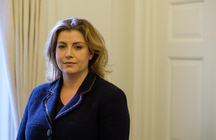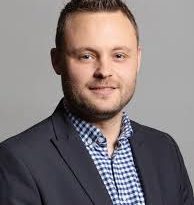Penny Mordaunt – 2018 Speech on Gender Equality
Below is the text of the speech made by Penny Mordaunt, the Secretary of State for International Development, on 7 March 2018.
Why are we here today? Why are you here today?
What made you get involved in your respective organisations?
What made you want to help? To change things, to make the world a better place?
Perhaps I should also ask you what made you endure? What made you expose yourself to abuse or ridicule? To overcome fear, to stand up to thugs or threats, or be sassy on social media?
What made you wake up to this cause? What makes the British people donate so generously or volunteer?
Maybe it’s that they are angry, or that you are angry at injustice?
At girls being denied an education? Angry that half of the women in the world have experienced physical or sexual violence?
Or that in some conflict zones, that rises to almost all women?
Or that 12 year olds are being forced to marry? Or that young teenagers are becoming mothers or dying in the process?
Angry because in 18 countries women still need permission from a man to have a job?
Angry that many who do work often take home less money for the same work?
And that millions of girls around the world, and 24,000 here in the UK are at risk from FGM?
Or maybe you are angry at how you have been treated in the past?
Some of you might be concerned. Concerned that as last year’s news brought from the World Economic Forum on gender pay gap report. That found that the gender gap is widening for the first time in decades.
Or maybe you are concerned that the Me Too movement is just restricted to the developed world?
Or maybe you are frustrated at all that talent and potential wasted?
The McKinsey Global Institute estimates that equality in the job market would yield add an extra £20 trillion to global GDP by 2025.
But what can’t be measured is the lost ideas, the dreams never realised, the businesses never built, the opportunities missed.
Maybe you are exasperated that we stand no chance of meeting any of the Global Goals unless we address gender equality.
Some of you might be hopeful, I know I am.
When we include women great things happen. When we negotiate peace treaties they are a one third more likely to work. When we serve in services or in the armed forces, these organisations become so much more effective.
Whatever your reasons for being here today, I think perhaps there is one motive which unites us all – and that is love.
Love of humanity, and our love of women around the world. A love of freedom, the freedom for every individual around the world to reach their full potential. And of faith, that every human being matters and that every human being can make a difference.
Whether they are aid workers, charity workers, trustees, governors, academics, teachers, doctors, soldiers, entrepreneurs, artists or mothers, I see love as the motivation for so many trying to make the world a better place.
And politicians too. In Parliaments, in peace councils, in village councils. And in Westminster too. Love.
Love is my lasting impression of Jo Cox. Jo and I sat on different sides of the house but we were frequent correspondents. We scribbled hand written notes to each other very frequently.
She was an opposition back bencher and I was Minister of State for the Armed Forces. But we were trying together to build a coalition across the house on Syria.
I treasure her letters.
She was angry, she was frustrated, she was hopeful. And she burned with a love, passion and empathy for those caught up in a brutal conflict.
And that love and her determination now echo in the work of her memorial fund.
I am pleased to help that work today by announcing £10 million of new funding in Jo’s memory.
Jo’s sister Kim will tell you more about social, economic and political empowerment work of the Jo Cox Memorial Fund.
And it is doing that by ensuring that women are leading that work, and making the decisions that impact their lives.
In addition, we will support the Jo Cox Memorial Fund in its work to strengthen civil society organisations, to prevent and protect civilians from mass atrocities.
As part of our new strategic vision, we are pledging £6 million over four years to the UN Data Programme, making every woman and girl count.
Through this we will be able to accurately understand the needs of women and girls, the challenges they face and monitor how much progress we are making.
We are also today announcing new support through UK Aid Match, to tackle violence against women and girls in Kenya. And we are launching a new shared approach across the UK Government to gender in Syria.
This will bring our existing commitment from tackling violence, to empowering women, to engage in the political process together. And mean that the British government places women and girls at the heart of our efforts to bring an end to conflict and bring forth a peace which includes everyone.
We are launching a new call to action today through our new plan. This is a call to action for everyone, recognising that we all need to take action in everything we do, if gender equality is to become a lasting reality.
If we succeed, girls, women, men and boys across the globe will be equal, empowered and safe.
And countries will enjoy prosperity, peace and stability.
We need to challenge and change unequal power relations between men and women. We need to build the interlinked foundations which will have a transformational impact for girls and women.
We need to protect and empower girls and women in conflict, protracted crises and humanitarian emergencies.
We must leave no girl or woman behind.
We need to integrate gender equality in all our work across the board, and track delivery through results on jobs, on trade, tax systems in the world economy, new technologies, modern slavery, climate change, nutrition, tackling AIDS, infrastructure and peace agreements.
We need to work across girls and women’s life cycles, on multiple areas simultaneously, with particular attention of adolescents.
We need to build evidence and disaggregate data. And we need to make that information publically available.
Today, we are doing a very untypical female thing. We are going to be asking for more.
Because without more we will fail the world.
Women’s empowerment, women’s rights, women’s talents and gifts are the entire margin of victory in the fight for prosperity, security and peace.
Without gender equality, we will never achieve any of the global goals.
A century ago, Emmeline Pankhurst said that “women have always fought for men and their children, but now they were prepared to fight for their own rights”.
Today, we must recognise they are the same thing. Without women’s rights, there are no human rights. Her potential is our future.
Whatever your motives, thank you for being here.


